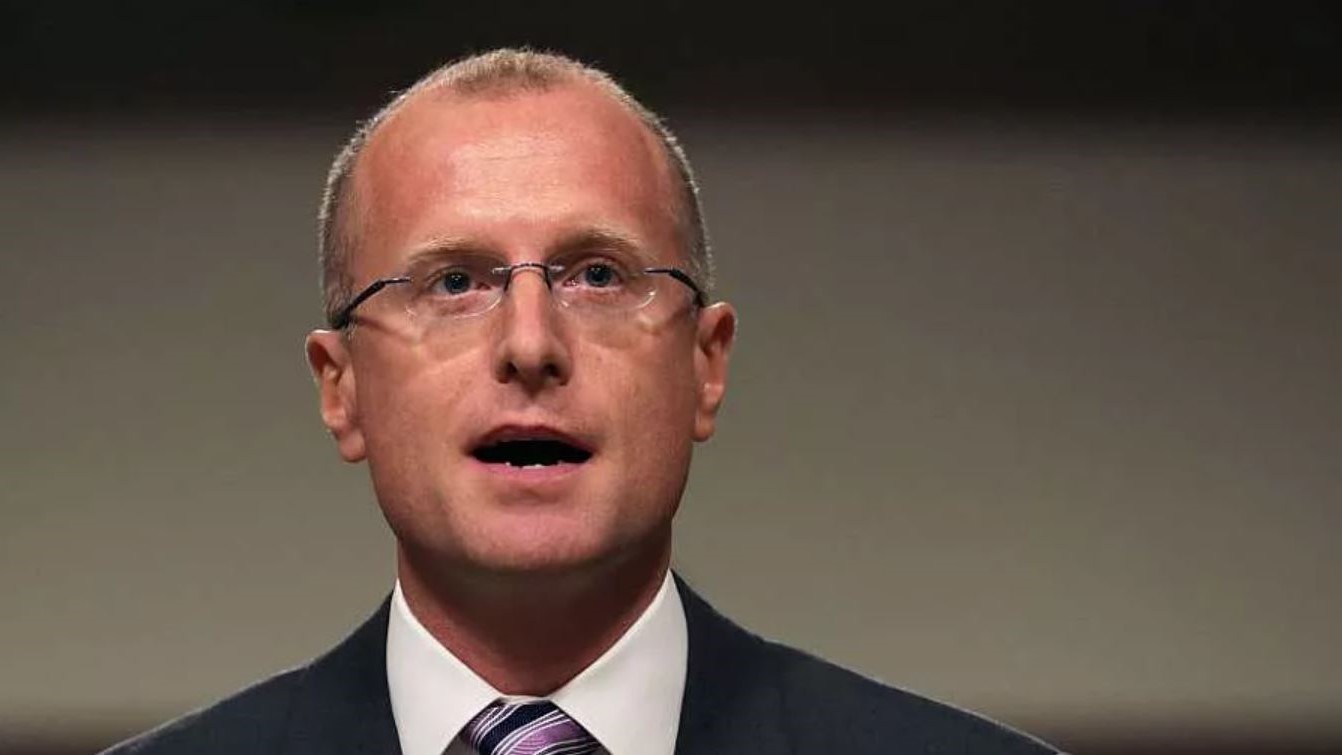
WASHINGTON—President-elect Donald Trump has nominated Brendan Carr as the next chair of the Federal Communications Commission. Trump first placed Carr on the FCC during his first term, in 2017.
Unlike some of his most recent nominations, Trump’s naming of Carr to lead the FCC starting in January follows a fairly traditional norm of tapping a prominent commissioner of the incoming party to the post, as was done in 2017 when then-commissioner Ajit Pai took the helm, and in 2021 when President Joe Biden selected current chair Jessica Rosenworcel.
Carr has a history of traditional Republican approaches to telecommunications, supporting deregulation and the protection of conservative voices in media. He penned the chapter in Project 2025, a wide-ranging document from the Heritage Foundation and what some believe to be the blueprint for the second Trump administration. In the chapter, he advocated for the administration to have tighter control over big tech and what he views as a widespread “cancel culture,” particularly in social media.
“The censorship cartel must be dismantled,” Mr. Carr posted on X (formerly Twitter), right after the election.
"Commissioner Carr is a warrior for free speech, and has fought against the regulatory lawfare that has stifled Americans' freedoms, and held back our economy," Trump said in his nominating statement on Sunday. “He will end the regulatory onslaught that has been crippling America's job creators and innovators and ensure that the FCC delivers for rural America.”
Carr also supports banning TikTok in the U.S. “I just don't see a path forward where we can allow this app to continue to operate in its current form,” he told NPR in 2022.
In Carr, broadcasters see an advocate for deregulation, particularly when it comes to ownership issues. During the current term, the fight over the proposed merger of Tegna with Standard General became a symbol of the tension between Democrats—which currently hold the majority on the commission—and Republicans. Rosenworcel in particular voiced her opposition to the deal over concerns about its potential impact on media diversity, competition and consumer costs.
The professional video industry's #1 source for news, trends and product and tech information. Sign up below.
When the commission approved a move to appoint an administrative law judge to oversee certain parts of the controversial deal, Carr made a point of the decline in journalism, particularly at the local level and said the merger would help broadcasters better compete in a media environment increasingly dominated by big tech.
“At this moment, the FCC should be working to encourage more of the investment necessary for these local broadcasters to innovate and thrive,” Carr said at the time. “It does the opposite today. After a protracted, nearly yearlong review, the commission should be providing the parties with a decision on the merits—not an uncertain future.”
Post election, Perry Sook, CEO of Nexstar Media Grpoup, the largest TV station group in the U.S., expressed optimism towards a new administration and called for less regulation and continued advocacy of the broadcast industry’s transition to ATSC 3.0 (aka NextGen TV).
“Progress on deregulation has been a catalyst for multiple expansion in the past,” Sook told investors. “So we plan to move with a sense of urgency on this as well as push for the formal adoption of ATSC 3.0 as our industry's transmission standard. That is our and our trade association’s No. 2 priority with this new administration.”
Unlike the current chair, Carr appears to be more vocally supportive of broadcasters’ transition to NextGen TV. Speaking at the Advanced Television Systems Committee’s annual meeting in Washington last June, Carr advocated a market-based, lightly regulated approach, much like what the cellular industry took when moving to 5G. He did, however raise eyebrows when he addressed an issue that keeps some broadcasters up at night—the risk to valuable spectrum. That risk could be exacerbated by the inability to make a date certain to shut down ATSC 1.0, but sunsetting 1.0 in combination with advocating for a friendlier consolidation market could help broadcasters better compete, Carr said.
“The transition that we see in technologies from a wireless approach is one that we should take here,” Carr said, referring to 3.0. “We largely trust the mobile wireless industry to handle those upgrades in technology … you’re getting the playbook here.
“We have to get to a point of a level regulatory playing field and increased investment,” Carr added. “In broadcasting, we have to allow this flash cut to 3.0 by a date certain and forthrightly and we also need to really consider competition in D.C. around potentially an ‘incentive auction 2.0’ as well.”
The National Association of Broadcaters on Sunday issued its congratulations to Carr’s nomination, saying: “Commissioner Carr has been a steadfast leader in holding Big Tech accountable and supporting policies that will allow local broadcast stations to better compete with these behemoths and thrive. We are excited to continue our work with the chairman-designate to level the playing field and remove regulatory barriers that impede investment in local broadcast newsrooms. Together we will ensure local television and radio stations can innovate and continue to serve communities across the country.”
Not everyone was so complimentary, though. Craig Aaron, co-CEO of advocacy group Free Press Action, warned that Carr’s nomination will endanger free speech and the FCC’s charter of promoting public discourse.
“Brendan Carr has been campaigning for this job with promises to do the bidding of Donald Trump and Elon Musk,” Aaron said. “Carr doesn’t care about protecting the public interest; he got this job because he will carry out Trump and Musk’s personal vendettas. While styling himself as a free-speech champion, Carr refused to stand up when Trump threatened to take away the broadcast licenses of TV stations for daring to fact-check him during the campaign. This alone should be disqualifying.
“The public needs a watchdog looking out for them at this independent agency, not an attack dog for Trump and Musk. Carr’s agenda includes giving away billions in taxpayer dollars to favored corporations like Musk’s Starlink satellite business. He supports media mergers and will give Trump’s cronies control of even more TV and radio stations. He’s committed to ending Net Neutrality and undermining the FCC’s ability to hold accountable companies like AT&T, Comcast and Verizon for abusing internet users.
“Carr is the only sitting government official who co-authored a chapter in the extremist Project 2025 policy road map that will apparently guide this administration,” Aaron continued. “His close relationships with far-right zealots and his craven cozying up to the CEOs he’s supposed to be regulating tell you everything about the kind of FCC chairman he will be. For more than a year now, Carr has been auditioning for this job, desperate to gain Trump’s attention and show how he’s willing to bend the rules and twist the law to serve this administration. His groveling is now being rewarded with a promotion, and it’s the American public who will pay a heavy price.”
Tom has covered the broadcast technology market for the past 25 years, including three years handling member communications for the National Association of Broadcasters followed by a year as editor of Video Technology News and DTV Business executive newsletters for Phillips Publishing. In 1999 he launched digitalbroadcasting.com for internet B2B portal Verticalnet. He is also a charter member of the CTA's Academy of Digital TV Pioneers. Since 2001, he has been editor-in-chief of TV Tech (www.tvtech.com), the leading source of news and information on broadcast and related media technology and is a frequent contributor and moderator to the brand’s Tech Leadership events.

